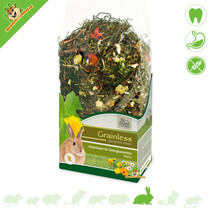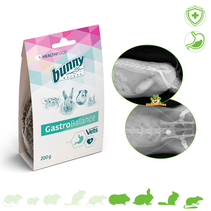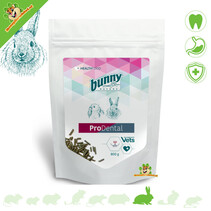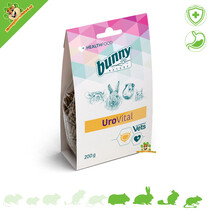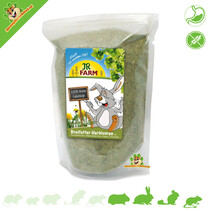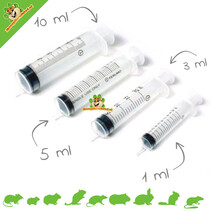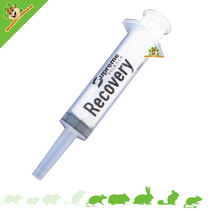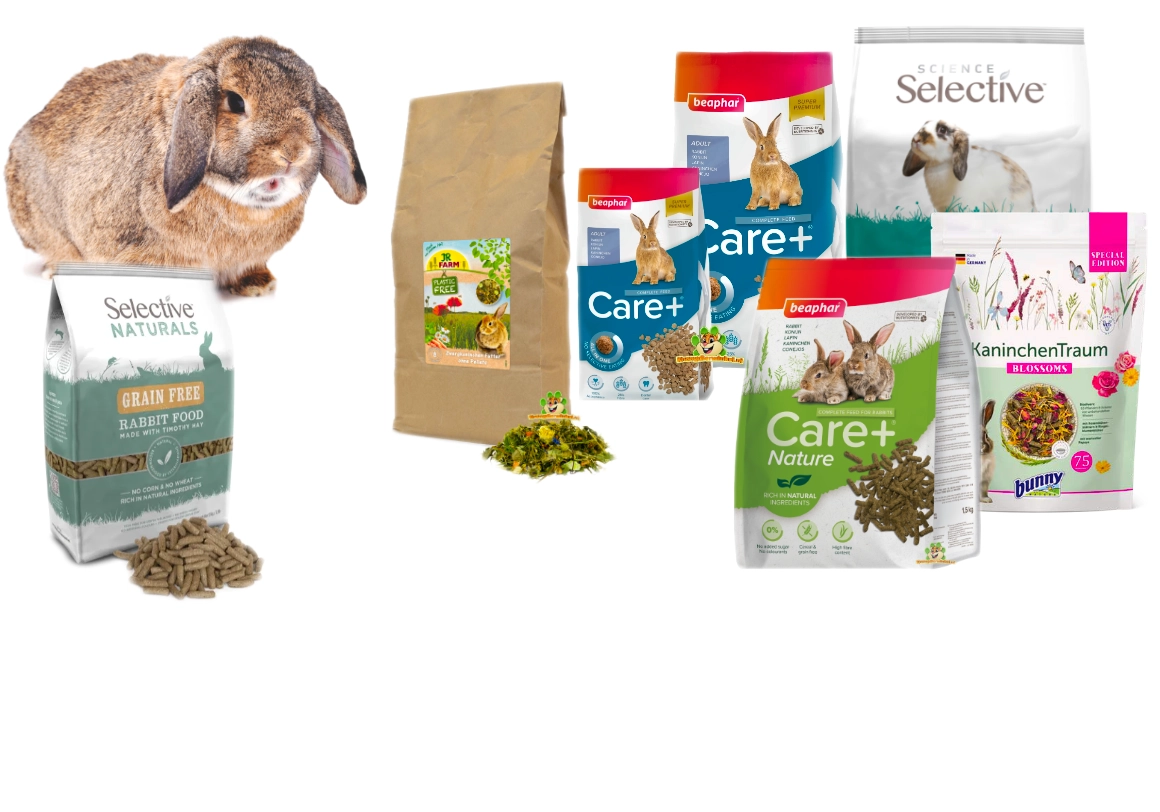Rabbit Food and Natural Rabbit Nutrition! Natural & Healthy Food for Every Rabbit
- Ordered before 5 p.m., shipped the same day!
- Al 14 jaar een begrip!
- Delivery from our own stock
You can order rabbit food quickly and easily at DRD Rodent Shop ®
At DRD Rodent Shop®, ordering healthy rabbit food is super easy! We make sure that your furry friend gets exactly the balanced, fiber-rich food that his sensitive digestion needs. Our rabbit food is not only nutritious, but also simply rabbit-tastic!
A good diet is essential for a healthy and vital rabbit. That is why you will only find high-quality rabbit food that is tailored to the natural needs of rabbits. Our range consists of natural rabbit food , sugar-free chunks , extruded complete food and delicious herb-rich mixes . All food is carefully selected based on fiber content, freshness and quality .
We are rodent and rabbit experts, and you can tell from our range. Not every brand is allowed to appear on our shelves - we only choose the best of the best. Every product must meet our high standards: fresh, nutritious, long-lasting and fully tailored to the nutritional needs of the rabbit .
Did you know that rabbits are herbivores that belong to the order of lagomorphs? They are mainly active at dusk and at night. As social animals, they feel best in a pair or group. A good food is therefore not only tasty, but also supports their digestion, teeth and general well-being.
At DRD Knaagdierwinkel® you will not just find rabbit food, but a complete range for a happy, healthy and active rabbit. Whether you are looking for food for young rabbits, senior rabbits or just the best for your buddy - you will find it with us!
Don't forget: hay is the basis! Also check out our range of hay for rabbits
Which food is best for my rabbit?
The best rabbit food contains natural ingredients such as grasses, herbs and leaves, without added sugars or artificial substances.
What is the difference between mixed feed and extruded pellets?
Mixed feed contains loose ingredients that rabbits can pick out. Extruded pellets are complete and ensure that every bite has the same nutritional value.
Can I give this food to young or older rabbits?
Yes, but please note: young, pregnant or older rabbits may have different needs. See our special varieties for these ages or stages.
Is this food complete or do I still need to give hay?
Rabbit food is a supplement. Hay is always the basis of the diet. The food contains extra nutrients, but is not a replacement for hay.
How much rabbit food do I give per day?
Average 20-30 grams per kilo body weight per day. Too much feed can cause overweight and less hay intake.
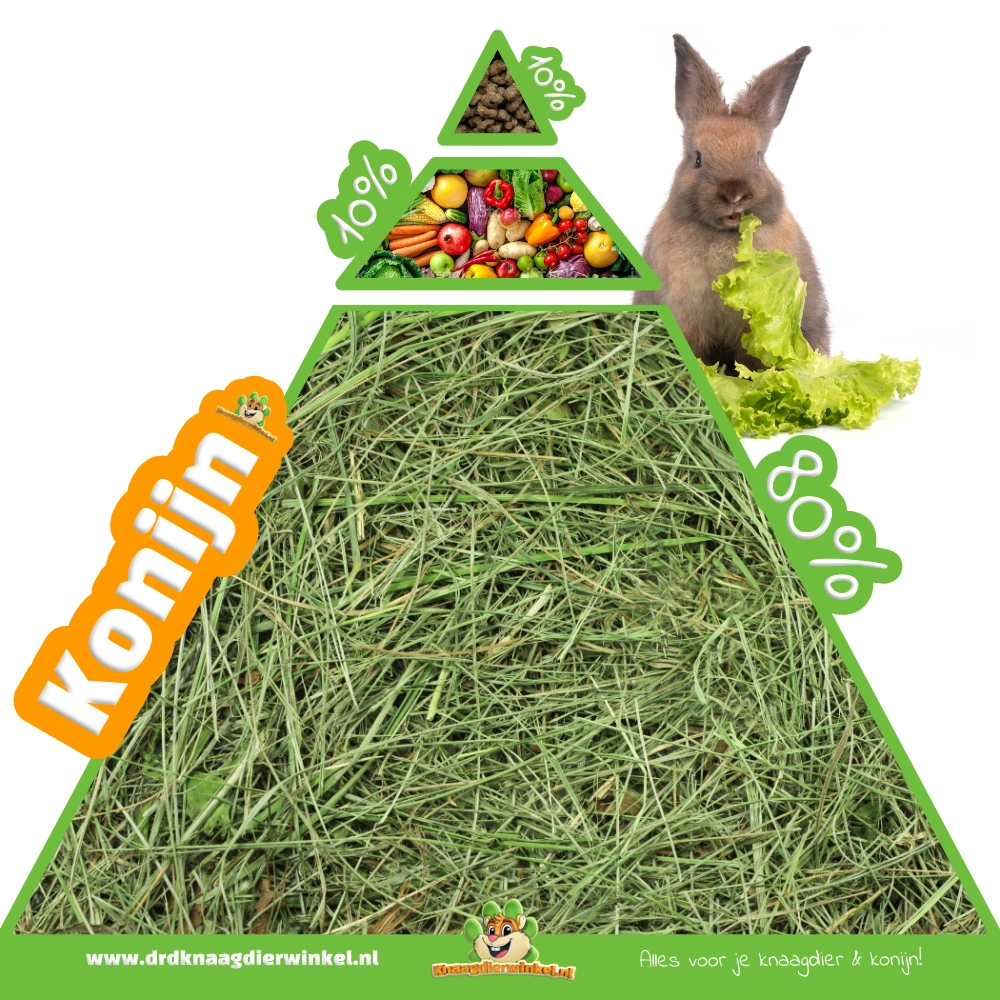
Feeding guide for rabbits
Rabbits require a low-energy, high-fiber diet. Their digestive system is designed to digest high-fiber foods, primarily in the large intestine. Hay should always be available, as rabbits need to be able to nibble at all times. A rabbit’s gastrointestinal tract is passive and weakly muscled. It does not make peristaltic movements to push food along. Food must be pushed along by constant intake of food.
If your rabbit is given too much energy-rich food, it may have too long 'meal breaks'. In the wild, a rabbit eats 80 to 120 small meals a day! They are practically busy eating all day long, just like a true gourmet.
Rabbit food & fiber
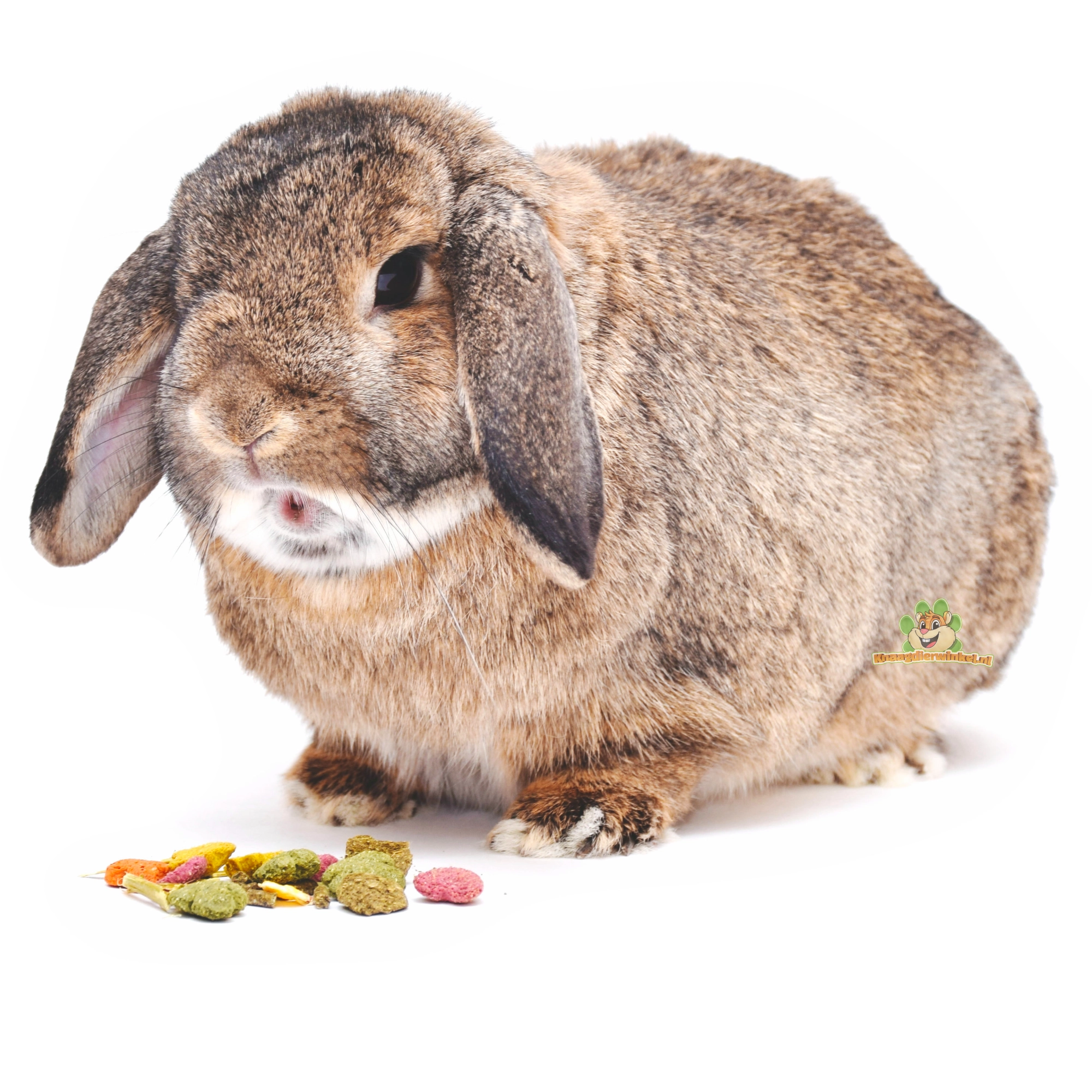 Rabbits are herbivores and have a unique digestive system that is adapted to eating fiber-rich foods. Their digestive tract is designed to break down and digest large amounts of fiber. Therefore, it is important to make sure they get enough fiber in their diet.
Rabbits are herbivores and have a unique digestive system that is adapted to eating fiber-rich foods. Their digestive tract is designed to break down and digest large amounts of fiber. Therefore, it is important to make sure they get enough fiber in their diet.
One of the most important foods for rabbits is hay. Hay is rich in fiber and helps promote intestinal health in rabbits. It stimulates intestinal movements and prevents problems such as constipation and diarrhea. In addition, hay helps wear down rabbits' teeth, which are constantly growing. Chewing on hay helps wear down the teeth in a natural way and prevents dental problems.
In addition to hay, rabbit food can consist of pellets or chunks. It is important to choose high-quality pellets that are specially formulated for rabbits. When choosing pellets, pay attention to the fiber content. A good rabbit food contains at least 18% fiber. Fiber is essential for good digestion and helps support intestinal health.
It is important to monitor your rabbit’s diet and ensure it is getting the right amount of nutrients. Overfeeding can lead to obesity and other health problems, while underfeeding can lead to nutritional deficiencies and digestive problems. Refer to the recommended feeding guidelines on your rabbit food packaging and also consider your rabbit’s individual needs and activity levels.
In addition to hay and pellets, rabbits can also eat small amounts of fresh fruits and vegetables. However, it is important to know which fruits and vegetables are safe for rabbits, as some foods can be harmful. Provide fruits and vegetables as treats and make them a small part of your rabbit's total diet.
Finally, it is important to always provide fresh water for your rabbit. Make sure the water is changed daily and that the drinking bottle or water bowl is clean.
Feeding rabbits the right food and sufficient fibre is essential for their health and well-being. Promoting healthy digestion and preventing problems such as constipation and diarrhoea can be achieved by feeding a balanced diet of hay, pellets and limited amounts of fruit and vegetables.
Rabbit food & protein
Rabbits do need (vegetable) proteins as part of their diet, but it is important to find the right balance. Proteins are essential nutrients used for the growth, repair and maintenance of muscles and other body tissues.
Young rabbits generally need a little more protein than adult rabbits, as they are still growing. Older rabbits may also benefit from a little more protein, as they can lose muscle mass as they age. However, adult rabbits generally do not have extremely high protein requirements.
It is important to remember that rabbits in the wild eat their own cecotropes, which are rich in vitamins and proteins. These pellets are produced in the cecum, where the smallest fibre components are broken down. By eating these pellets, the rabbit gets important nutrients back into its system.
If a rabbit gets too much protein in its diet, it may stop eating the cecotropes. This can lead to digestive problems, such as diarrhea and sticky poop. It is therefore important to keep the protein content in a rabbit's diet balanced.
High quality rabbit foods and pellets usually contain the right amount of protein that rabbits need for good health. However, it is important to avoid overfeeding your rabbit with protein rich foods such as seeds, nuts, legumes or too many pellets. These foods can be too high in protein and can cause problems.
It is always advisable to discuss your rabbit's diet with a vet, especially if you have specific concerns about your rabbit's protein requirements. A vet can give you tailored advice based on your rabbit's age, health and other individual needs.
Rabbit Food & Calcium
Calcium is indeed an essential nutrient for rabbits, as it is important for dental and skeletal health. It plays a crucial role in bone formation and strength.
However, it is important to balance the calcium intake of rabbits, as too much calcium can be harmful. Rabbits have a unique calcium metabolism, in which excess calcium is excreted through the kidneys and urinary tract. If there is an excess of calcium, it can lead to the formation of bladder stones in rabbits. Bladder stones are hard deposits that can form in the bladder or urinary tract and can cause problems with urination.
It is important to regulate the calcium content in the rabbit's diet to prevent bladder stones. Adult rabbits generally require a calcium content of around 0.6% in their diet. It is also important to monitor the calcium to phosphorus ratio in the diet, with the ideal ratio being between 1.5:1 and 2:1.
It is advisable to use a high-quality rabbit food that is specially formulated for the nutritional needs of rabbits. These foods usually contain the right balance of calcium and other nutrients that rabbits need. In addition, it is important to provide sufficient roughage in the rabbit's diet, such as hay, as this can help regulate calcium intake.
It is also important to avoid feeding rabbits diets that are excessively high in calcium, such as calcium-rich vegetables, supplements or excessive use of pellets. This can lead to an imbalance in calcium intake and cause problems.
If you are concerned about your rabbit's calcium intake or have specific questions about their diet, it is advisable to contact a veterinarian. A veterinarian can give you specific advice based on your rabbit's needs and health.
Rabbit food & fats
Fats are indeed an important part of a rabbit's diet. Essential fatty acids, such as omega-3 and omega-6 fatty acids, are needed for several bodily functions, including the absorption of fat-soluble vitamins, the health of the skin and coat, and supporting the immune system.
Although fats are important, it is true that too much fat in a rabbit’s diet can cause problems. A diet that is too rich in fat can cause digestive problems such as diarrhea, disrupted intestinal flora, and reduced food digestion. It can also lead to weight gain and obesity, which in turn can lead to other health problems in rabbits.
Therefore, it is important to balance the fat content in the rabbit diet. In general, it is recommended to feed rabbit food that has a moderate fat content, which meets the nutritional needs of the rabbit without excessive fat intake.
It is also important to note that the source of fat in a rabbit’s diet is important. It is best to choose healthy fat sources, such as vegetable oils or seeds, rather than animal fats. Saturated fats should be avoided as much as possible, as they can contribute to health problems.
As with every aspect of a rabbit's diet, it is advisable to use a high-quality rabbit food that is formulated to meet the nutritional needs of rabbits. In addition, the diet should be supplemented with adequate roughage, such as hay, which is essential for good gut health and the proper functioning of the digestive system.
If you have any questions about your rabbit's diet or are concerned about the fat content, it is wise to consult a veterinarian or rabbit nutritionist. They can help you determine the right nutrition and balance in your rabbit's diet.
Rabbit Teeth
Rabbit teeth are indeed unique in that they continue to grow throughout the rabbit’s life. This applies to both the incisors, which are located in the upper and lower jaws, and the molars. Because of this, it is important to ensure that the position of the teeth is correct so that they can wear down naturally and not continue to grow uncontrollably.
To promote optimal wear of the teeth, the choice of food is an important factor. It is essential that the food has a rough fiber structure. This means that the rabbit must get enough roughage, such as hay, grass and leafy vegetables. These foods require a good chewing movement, which helps to wear down the teeth.
Roughage is essential because the rabbit has a wear effect on the teeth when chewing. It also helps to maintain the correct position of the teeth and prevent excessive growth. By constantly chewing roughage, the teeth are worn down to a normal length.
In addition to roughage, providing fresh vegetables and certain types of wood (e.g. willow) can also help promote tooth wear. This encourages the rabbit to gnaw and helps the natural wear process of the teeth.
It is important to note that a diet consisting primarily of soft foods, such as commercial rabbit food high in starch and sugars, is not sufficient for proper tooth wear. The rabbit needs the constant stimulation of roughage to keep its teeth healthy.
If a rabbit’s teeth are not wearing down naturally or if there are other problems, such as excessive growth, misalignment, or dental problems, it is important to consult a veterinarian as soon as possible. A veterinarian can assess the rabbit’s teeth and take any necessary steps to restore dental health if necessary.
In short, correct tooth position and a diet with sufficient crude fibre are crucial to promote optimal wear of rabbit teeth and prevent dental problems.
The stomach of rabbits
Rabbits do indeed have a special type of stomach, also called a 'stuffed stomach'. Unlike other animals, the rabbit stomach is less muscular and cannot independently transport food to the next part of the intestinal tract.
Instead, this process is taken over by the food portions that are taken in one after the other. This explains why rabbits eat an average of 80-120 small portions of food per day. These portions should be adjusted to the maintenance needs of adult rabbits or to the growth of young rabbits.
It is important to manage your rabbit's diet properly to prevent digestive problems and obesity. Feeding too much food at once can cause problems because the rabbit's stomach is not able to process large amounts of food efficiently. Dividing the daily food into several small portions helps keep the rabbit's digestive system functioning optimally.
Therefore, it is advisable to adjust the diet of rabbits to their specific needs, such as the maintenance needs of adult animals or the growth of young rabbits. It is important to provide the right amount of food that meets the nutritional needs of the rabbit, without overfeeding.
It is also essential to ensure that the rabbits diet is varied and includes a combination of hay, fresh vegetables, limited amounts of pellets and the occasional bit of fruit. This will provide a good balance of nutrients and fibre which is necessary for healthy digestion.
By taking into account the special stomach structure of rabbits and their need for frequent small food portions, digestive problems and obesity can be avoided, thus promoting the overall health and well-being of the rabbits.
The appendix of rabbits
The rabbit's cecum plays an important role in their digestive system. The large cecum functions as a kind of fermentation chamber in which fine dietary fibers end up. In this cecum, the dietary fibers are converted into proteins, vitamin B complex and vitamin K by special bacteria.
A unique aspect of the rabbit cecum is the production of cecotropes. These pellets are grape-shaped and covered in a mucus layer. They are eaten by rabbits directly from the anus, a process known as cecotrophy. This is a natural process that is vital to the health of rabbits.
The consumed cecotropes are then digested in the small intestine, allowing the rabbits to absorb essential nutrients such as proteins and vitamins. These pellets are rich in nutrients, especially the aforementioned proteins and vitamins, which are formed in the cecum during the first part of digestion.
By re-eating the cecotropes, rabbits can optimally benefit from these valuable nutrients. The process of cecotrophy is therefore crucial to the health and well-being of rabbits. It provides them with nutrients that would otherwise be lost.
It is important to understand that cecotropes and regular droppings, which are mostly indigestible fiber, are two different types of feces. It is normal for rabbits to eat cecotropes and it is an essential part of their digestive process.
However, it is also important to provide a balanced diet that contains the right amount of dietary fiber to support healthy cecal function. A diet consisting primarily of hay, supplemented with a moderate amount of fresh vegetables, limited amounts of pellets, and occasional fruit will help to stimulate the proper functioning of the cecum and promote healthy digestion in rabbits.
Calcium - phosphorus
the development and maintenance of strong bones and teeth. A balanced ratio of calcium and phosphorus in the rabbit diet is important to prevent health problems.
Rabbits have a specific calcium metabolism where calcium is mainly stored in the bones and teeth. It is essential that they get enough calcium in their diet to keep these structural elements healthy.
However, too much calcium in the diet of adult rabbits can lead to bladder grit or even bladder stones, because excess calcium is excreted in the urine. Therefore, it is important to choose the right nutritional components to optimize calcium intake.
The optimal calcium levels in the basic feed are as follows:
Young rabbits: 0.9% calcium* Adult rabbits: 0.6% calcium
The higher calcium content in the diet of young rabbits is due to their rapid growth and development. They need more calcium to build healthy bones and teeth during this growth phase. As rabbits mature, the calcium content in their diet can be reduced to 0.6%, which is sufficient to maintain their bone health without causing excessive calcium deposits.
It is also important to ensure a balanced ratio of calcium to phosphorus in the diet. It is generally recommended that the calcium/phosphorus ratio be between 1.5:1 and 2:1 for a healthy rabbit diet.
Maintaining the correct balance of calcium and phosphorus in the diet and following the recommended calcium levels for different life stages of rabbits can help to reduce the risk of health problems such as bladder grit or stones and help rabbits to maintain optimum bone and dental health. If in doubt or for specific dietary needs of rabbits, it is advisable to seek advice from a veterinarian or specialist rabbit expert.
Importance of crude fiber-starch ratio
The ratio of crude fibre to starch in the rabbit diet is of great importance to their health. Both crude fibre and starch have different effects on the digestion and general well-being of rabbits.
Crude fibres are essential for the health of rabbits. They contribute to good digestion, support the functioning of the appendix and are important for the wear of the teeth. Food with a crude fibre structure is necessary to promote tooth wear in a natural way. A good rabbit food should contain about 20% crude fibre to meet the needs of the rabbit.
Starch, on the other hand, is primarily a source of energy and should be present in limited quantities in the diet. Excess starch in the diet can lead to various problems. An ideal guideline for starch in high-quality rabbit food is below 7%. Excessive starch intake can lead to eating pauses, changes in the intestinal flora, swelling, diarrhea, fermentation and even obesity.
An imbalance between crude fibre and starch can be detrimental to rabbit health in the long term. Too little crude fibre can lead to intestinal sluggishness, changes in the intestinal flora and problems with the functioning of the caecum. Too much starch can lead to digestive problems, disruption of the intestinal flora, swelling, diarrhoea, fermentation and obesity.
For these reasons, veterinarians generally recommend a minimum ratio of 3:1 between crude fiber and starch in a rabbit's diet. This ratio ensures that rabbits receive sufficient crude fiber for healthy digestion and dental health, while limiting starch intake to prevent problems.
It is important to remember that rabbits are herbivores and have evolved to eat a high fibre diet. Therefore, it is essential to choose a high quality rabbit food that contains sufficient crude fibre and limits starch intake, as well as providing a varied range of suitable vegetables and hay. If in doubt or for your rabbit’s specific dietary needs, consult a vet or specialist rabbit expert.
How do I actually know how much starch my food contains?
The composition is very useful: whole grains (with starchy endosperm), field beans, potatoes or peas are an indication that a higher starch content should be taken into account.



